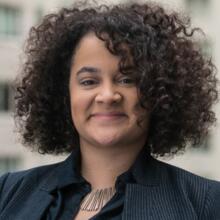“I love America more than any other country in this world, and, exactly for this reason, I insist on the right to criticize her perpetually.”
James Baldwin first said these words over 60 years ago; and these words were on my mind as I once again marched along with my fellow New Yorkers on Wednesday night. This time, we marched in honor of Freddie Gray, a 25-year-old African American killed while in the custody of the Baltimore Police Department. Baldwin’s call for national reflection seems especially timely now, as we face the aftermath of Mr. Gray’s death.
Today the state attorney for the city of Baltimore, Marilyn Mosby, announced that she has filed charges against the six police officers involved in the death of Mr. Gray. This follows a week of protests and rioting in cities across the country.
The unexpected announcement will undoubtedly add to the already polarized debate: from David Brooks in The New York Times insisting that cities like Baltimore need “a thinker who can describe poverty through the lens of social psychology”; to Ta-Nehisi Coates’ “Nonviolence as Compliance” in The Atlantic, writing, “when nonviolence begins halfway through the war with the aggressor calling time out, it exposes itself as a ruse.”
The loudest and most poignant voices, however, have been heard from the activists and protestors “shutting down” city streets.
This past Wednesday, representatives from N.Y.C. Justice League and thousand ofothers met at Union Square in New York City and made their way throughout various city streets for a march aptly named “#NYC2Baltimore.”
I had attended both the Eric Garner and Ferguson marches last year. However, the tensions, in light of Monday’s riots in Baltimore, between the New York City Police Department and protestors were much more apparent this time. After initial police barricades, various splinter groups managed to break out of Union Square (I marched along with a group headed toward Times Square) and wend their way onto sidewalks and into traffic, often encouraging drivers to “honk for justice.”
Throughout the march, the presence of officers was scattered. Aside from the helicopters flying above us, it seemed the NYPD would simply allow the peaceful marching to continue.
However, once protestors passed Times Square, the police presence reappeared, tenfold. Dressed in riot gear, officers ran behind protestors, initially as a scare tactic. However, once the protestors reassembled, the police once again employed this method, this time seizing and arresting a fellow protestor and friend.
I watched in fear and shock, held back by the protestors around me from following my friend, and wondered what to do next.
As I waited for the protestors start marching again, I waved at one of the cops in front of me and asked, “What do I do now? That was my friend.” The officer shrugged before answering, “Not my problem.”
Not my problem.
After the cop’s terse words, after spending hours attempting to locate my friend—calling various precincts, driving to One Police Plaza—my original draft for this piece was not a charitable one. I felt angry, afraid, powerless. I questioned the system; I questioned the movement; I questioned my own beliefs; I questioned whether I should write this piece. Activism often leaves you with more questions than answers.
I gave myself a few days, time to take in what had occurred; to analyze it in the context of the movement and from the perspective urged by James Baldwin.
Here are some of my reflections. We cannot live in a system where cops are openly aggressive and feared. We cannot live in a nation where the brown and black faces splattered across CNN or Fox News reinforce the fears of people of color. We should not live in a system where accountability is not instinctive. While the charges brought forth by Ms. Mosby are welcome, it will not be enough. Accountability should be the first step when lives are lost at the hands of those meant “to protect and serve.” What are the next steps?
Police officers must be willing to hold one another to the highest standards of the law. When the Rolling Stone rape case story first showed hints of error, journalists were the first to openly criticize the publication for not following the proper ethics of writing and fact checking. Why is it so difficult to demand the same for our protectors?
We must also close the divide that exists between communities and police officers. The most shocking moment of my recent protest experience was how fearful I became once I realized the power held by police officers—a fear that pales in comparison to those consistently harassed by cops. We cannot allow this fear to exist.
In an interview with America, Baltimore Archbishop William Lori describes the ways in which the church can help communities in crisis like Baltimore: “The church must be a force for peace, for justice, for reconciliation and bridge building.” Lori goes on to describe the need for hope, stating it is in “short supply in these neighborhoods.” He argues that “if one lived in these conditions and neighborhoods and saw no way out, the anger boiling over becomes, not justifiable, but understandable.”
After a week of so many emotions—sadness, fear, anger—I found solace in Archbishop Lori’s words of hope. I hope that Ms. Mosby’s charges eventually bring justice. I hope that our system changes. Mostly, I hope that there are no more names splattered on poster boards and hashtags.
Olga Segura is an associate editor at America.








